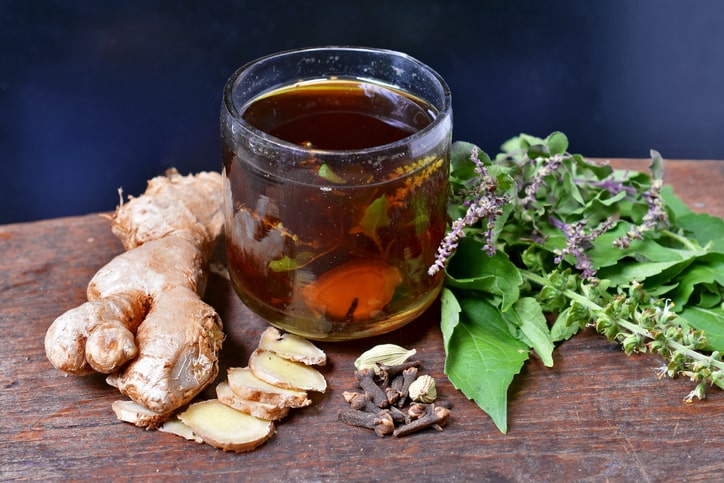Adaptogens for Kids: An Immune System Boost for Flu Season?

Flu season is just around the corner. We want to do everything we can to ensure our families stay healthy. Incorporating adaptogen supplements into our diet may benefit the immune system.
Adaptogens like turmeric and goji berries are gaining popularity as a superfood as many believe that they promote healing and provide everything from stress relief to anti-aging properties to warding off fatigue and flu symptoms!
You may have seen adaptogens at the grocery store in everything from coffee to protein bars to chewable gummies. According to a report by Global Market Insights Inc., the adaptogens market was valued at $8.5 billion in 2020 and is expected to reach around $14 billion by 2027.
Are all the benefits of adaptogens legit, or are they too good to be true?
Related: Stress Awareness Month: 6 Signs Your Child is Stressed
We spoke with the co-founder of family health and wellness brand Oh My Goodness Co-Founder, Margaret Elenis for her expertise on adaptogens to help you decide if you should incorporate them into your child’s diet.
Discover more about the potential benefits, risks and side effects of different adaptogens on kids’ immune system, stress and anxiety levels.
What are Adaptogens?
An adaptogen is any herb, root or fungi that are believed to offer health benefits and assist in regulating the immune system. Adaptogens are thought to work by enhancing the body’s ability to resist physical, chemical and biological stressors while supporting overall health and well-being.
Although these herbal plants and mushrooms have only recently become popular in the Western world, the use of adaptogens is actually an ancient practice. Adaptogens have been used in traditional medicine systems, such as Ayurveda and Traditional Chinese Medicine for centuries.
Are Adaptogens' Health Claims Backed By Science?
While there is growing interest in adaptogens, research on their mechanisms of action, safety and efficacy is ongoing. In a study published in the Journal of Pharmaceuticals in 2018, researchers examined the existing literature on adaptogens and their potential health benefits.
The researchers that adaptogens show promise in helping the body cope with stress and improve resilience, based on studies conducted on animals and some small human trials. However, more research is needed to fully understand how adaptogens work and their therapeutic potential.
Another 2018 study published in the Journal of Nutrients focused specifically on the adaptogen ashwagandha. The researchers reviewed several clinical trials and found evidence supporting the use of ashwagandha for reducing stress and anxiety and improving overall well-being. However, they emphasized the need for further research to determine the best dosages and ensure long-term safety.
Can Adaptogens Help Kids with Stress and Anxiety?
Adaptogens are thought to act on the adrenal glands – the body’s central stress response system. They are believed to help regulate the production of stress hormones like cortisol, ensuring that they are neither too high nor too low. This may help the body adapt more efficiently to stress without overreacting or becoming overwhelmed.

Adaptogens are believed to work at the cellular level by modulating stress response proteins and pathways. They may help protect cells from damage caused by oxidative stress, which is a common consequence of chronic stress. By reducing oxidative damage, adaptogens could support overall health.
Adaptogens are sometimes used to alleviate symptoms of anxiety and depression. While the mechanisms are not fully understood, it is thought that adaptogens may impact neurotransmitter levels, such as serotonin and dopamine, which play key roles in mood regulation.
What Adaptogens are Best for Stress?
Some examples of adaptogens that have been found to reduce stress and anxiety include the following:
Ashwagandha
Ashwagandha is one of the most well-known adaptogens. It’s traditionally used in Ayurvedic medicine and has been studied for its potential to reduce stress and anxiety. Ashwagandha is believed to help regulate cortisol levels and has a calming effect on the nervous system.
Panax Ginseng (Asian or Korean Ginseng)
This adaptogen is traditionally used in Chinese medicine. It may help improve mood, reduce fatigue and support overall well-being.
Rhodiola
Rhodiola is known for its potential to enhance physical and mental endurance. It’s thought to improve resistance to stress and reduce symptoms of anxiety and depression
Schisandra
This adaptogen is used in Traditional Chinese Medicine to improve mental clarity and combat stress. It’s believed to enhance both mental and physical performance while reducing fatigue.
Tulsi (“holy basil”)

Holy basil is revered in Ayurvedic medicine for its stress-relieving properties. It’s believed to have a calming effect on the mind and body and may help reduce anxiety.
While some individuals may find relief from stress and anxiety with adaptogenic herbs, others may not experience significant benefits.
It’s crucial to use adaptogens as part of a holistic approach to stress reduction which includes adopting stress management techniques and seeking professional support if needed.
Can Adaptogens Boost Kids’ Immune Systems?
We’ve all experienced getting sick after a stressful event or situation. Our stress levels are linked to how well our immune system functions.
One of the primary ways adaptogens may boost the immune system is by helping the body adapt to and cope with stress more effectively. Chronic stress can weaken the immune system over time, making the body more susceptible to infections. Adaptogens are believed to reduce the production of stress hormones like cortisol. Chronic elevations of cortisol in our body can have a detrimental effect on immune function.
Many adaptogens possess anti-inflammatory properties. Chronic inflammation can contribute to various health issues and weaken the immune system. By reducing inflammation, adaptogens may indirectly support immune function.
Several adaptogens such as Rhodiola rosea and Siberian ginseng are rich in antioxidants. Antioxidants help neutralize harmful free radicals in the body. Free radicals can damage immune cells and impair their function. Antioxidants protect immune cells and support their proper functioning.
It’s important to keep in mind that while there is promising research on the immune-supportive properties of adaptogens, more clinical studies are needed to confirm these mechanisms and effects conclusively.
More Examples of Adaptogen Benefits for Kids and Adults
Here are some of the adaptogens that Oh My Goodness uses in their food blends and their benefits:
Cocoa
Wait, chocolate can have health benefits? That’s right! Cocoa is one of the richest sources of polyphenols. It is especially abundant in flavanols, which have potent antioxidant and anti-inflammatory effects
Turkey Tail Mushroom
Next time you’re mushroom hunting, look out for Turkey Tail! These fungi promote healthy gut bacteria that have been shown to help with digestion and immune functions.
Goji
Soothie lovers might be familiar with this one. Gogi is an antioxidant berry known to improve immune function. It has high amounts of Vitamin C and lowers blood sugar. It provides immune support through high antioxidant properties.
Astragalus
Astragalus is a root that provides anti-bacterial and anti-inflammatory immune support. It protects the liver and supports the upper respiratory helping to prevent colds and flu-like illnesses.
Lions Mane
Also a popular nootropic for kids and adults, Lion Mane claims to boost cognitive function and help enhance memory. Maybe try to have kids take this before a big test to boost their confidence!
Spirulina
This adaptogen is a type of algae that is extremely high in many nutrients including Vitamin B. If your kids won’t swallow anything green, try stirring a spoonful of spirulina powder into their morning juice or fruit smoothie.
Collagen
Collagen is great for moms and kids alike – especially kids who play a lot of sports! Collagen is a supplement that helps make bones, joints and muscles stronger. It also is great for keeping your skin looking clear and hydrated!
Who Shouldn’t Take Adaptogens?
Supplements containing adaptogens are not regulated by the Food and Drug Administration (FDA). It’s important to research the brand and products prior to taking them.
You should never allow young children to take supplements like adaptogens unsupervised as they are meant to be taken in small, specific doses. It is possible to overdose on adaptogens and cause negative side effects.
The effects of adaptogens can vary from person to person. They should not be considered a permanent solution or treatment for a chronic health condition or severe illness.
Adaptogens are also not recommended for anyone who has low blood pressure, is pregnant or breastfeeding, has stomach ulcers or is diagnosed with thyroid issues.
Some adaptogens may interfere with the effects of certain medications. For example, ginseng can interact with blood thinner medication and licorice root is not safe for those who are pregnant as it can raise blood pressure.
Before using adaptogens or any other supplements, please consult with your healthcare practitioner, especially if you have underlying health issues or are taking medications.
Tips on Incorporating Adaptogens Into Your Kids’ Diet
Incorporating adaptogens into your diet can be a relatively straightforward process. Here are steps you can follow to get started:
-
Consult With a Healthcare Professional
Before adding adaptogens to your child’s diet, it’s advisable to consult with a healthcare professional or pediatrician about their specific needs. Your doctor can provide personalized recommendations and ensure there are no interactions with any other medication or medicine your child is already taking
-
Select a Form Your Child Will Take
Kids are picky eaters and many will fight against swallowing medicine, pills and vitamins. Thankfully, most adaptogens are available in various forms, including powders, teas, gummies and even granola bars!
Explore your local health food stores or look online to choose a form that is convenient and kid-friendly.
-
Start With Small Doses
If you’re having kids try adaptogens for the first, start with small doses to assess their tolerance and monitor how they respond – both physically and mentally.You may want to keep a journal to track any changes in their energy levels, mood or sleep quality.
Never exceed. the recommended dosage instructions on the product label or as advised by your healthcare provider.
-
Mix them into meals and drinks
Adaptogen powders and blends won’t be detected by even the pickiest eater when mixed into delicious foods they already love! You can mix the powders into anything from baked goods to yogurt to smoothies and milkshakes!
-
Combine with Other Healthy Family Habits
Adaptogens are most effective when combined with a balanced diet, regular exercise and other healthy lifestyle practices. Make sure your kids are still eating nutritious foods and getting enough time outside for play and exercise.
See these 5 Healthy Family Activities to Try Right Now for more ways to promote a healthy lifestyle for your whole family!

